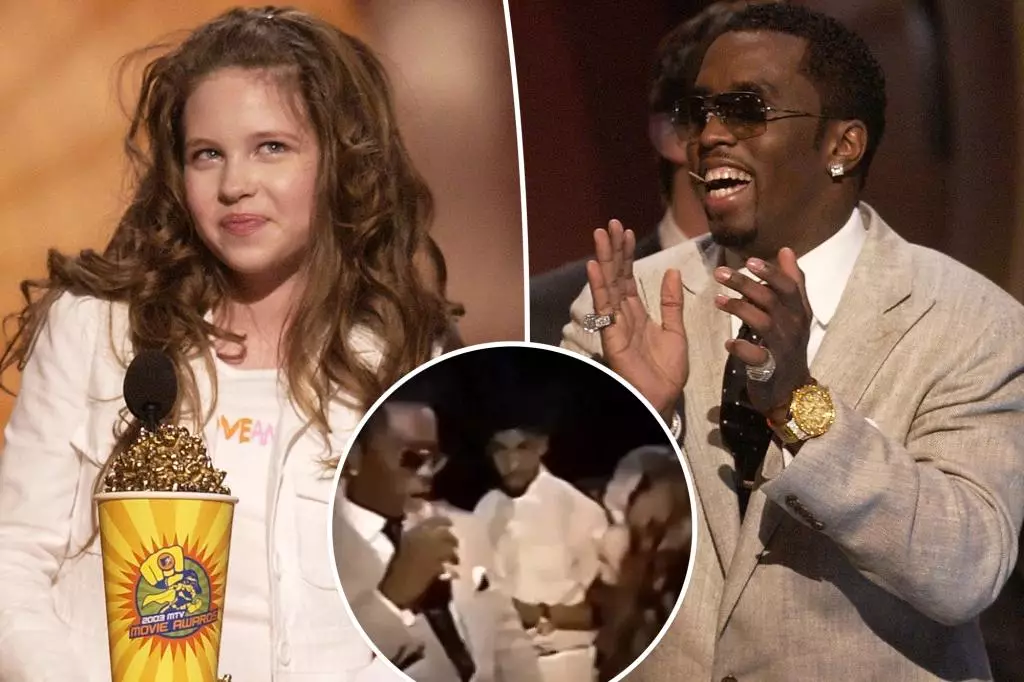The resurfacing of a video featuring Sean “Diddy” Combs has reignited discussions surrounding serious allegations of sexual misconduct leveled against the music mogul. The footage, dating back to the 2003 MTV Movie Awards, shows a young actress, Daveigh Chase, cheerfully accepting an invitation from Combs, then 33, to attend an afterparty. As the world revisits this moment, it’s imperative to analyze this development in the context of the serious accusations Combs now faces.
In the video, a teenage Daveigh Chase, known for her role in the horror film “The Ring,” engages with Combs in a seemingly innocent manner, making plans to attend an afterparty. The context speaks volumes; Combs was notorious for hosting extravagant and wild Hollywood parties, a backdrop that raises alarms given the current allegations against him. The fact that he approached a 12-year-old girl with an invitation to such an event creates a sense of discomfort, especially when considered alongside his recent legal troubles.
The online reaction to the video has been swift and severe. Commentators have pointed out the inherent unease in the scenario, with one social media user remarking on the unsettling nature of the encounter, claiming, “Diddy did all this publicly; imagine what happened behind closed doors.” Such sentiments reflect a collective concern regarding the possible predatory behavior disguised behind party invitations and celebrity charm.
As the video gains traction in light of the allegations against Combs, it illustrates a significant phenomenon—hindsight in analyzing interactions that may have previously seemed innocuous. The public’s reaction encapsulates a broader societal shift towards taking allegations of misconduct seriously, particularly when they involve minors. The juxtaposition of this video with the serious allegations currently facing Combs—ranging from sex trafficking to coercion—fuels a narrative of accountability that demands scrutiny.
One cannot help but question the ability of individuals in positions of power to navigate their influence without crossing ethical and moral boundaries. The playful interaction in the video, stripped of its context, appears harmless; however, when contextualized with the gravity of Combs’ alleged actions, it raises questions about the culture of celebrity entitlement and its potential ramifications on young, impressionable individuals, particularly women.
Combs’ current legal difficulties are severe and multifaceted, including charges of sexual assault involving numerous alleged victims. These accusations cast a long shadow over his legacy and transform what was once a charismatic persona into something far more complex and problematic. The allegations against him encompass a wide range, with reports indicating that one of the victims was as young as nine years old.
The details of these allegations bring forth critical questions about the responsibilities of those within the entertainment industry. How do societal norms shape the behaviors of powerful figures, and what accountability measures are in place to protect vulnerable individuals? Notably, the outrage surrounding the resurfaced video can be seen as a reflection of a society growing weary of tolerating the misconduct of prominent figures.
Combs’ spokesperson has expressed disappointment in how the media and social commentators have interpreted the resurfaced video, claiming it has been twisted out of context. While media representation can often exaggerate or misinterpret events, it’s crucial to recognize that public scrutiny stems from a desire for accountability. In this era where voices are being amplified and serious discussions about consent and abuse are unfolding, it’s essential to approach such sensitive topics sincerely and responsibly.
The conversation ignited by the video inevitably leads to further analysis of celebrity culture and its implications on young audiences. Chase, now 34, has chosen to maintain a low profile, withdrawing from the public eye in recent years, raising questions about her experiences in the industry. Her silence can be interpreted in multiple ways, but it underscores the long-term impact of such encounters on individuals who find themselves in vulnerable positions.
As the legal battles ensue and public discourse evolves, the implications of Sean Combs’ actions necessitate a broader dialogue about safety, power dynamics, and accountability in the entertainment world. The resurfaced video serves not merely as a sensational relic but as a catalyst for reflection on the need for structural changes in how we view and respond to the behaviors of those in power. As we venture further into discussions about consent and responsibility, accountability must not only be sought after in high-profile cases but deeply integrated into the culture surrounding celebrity and youth.

